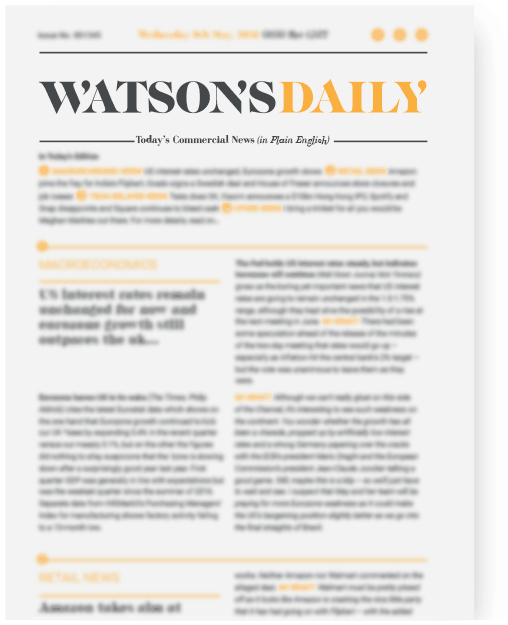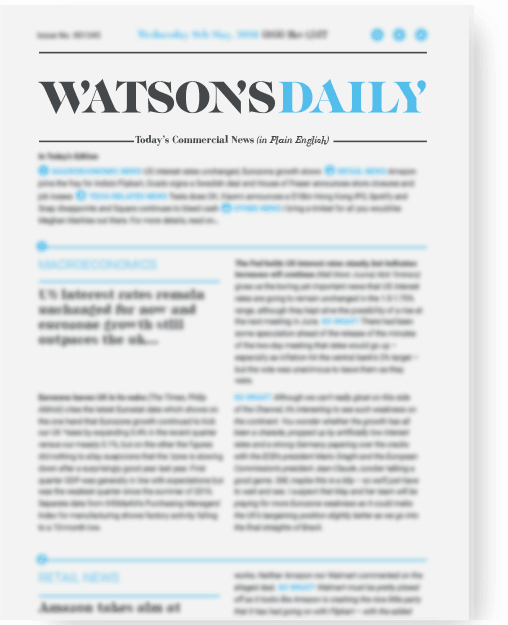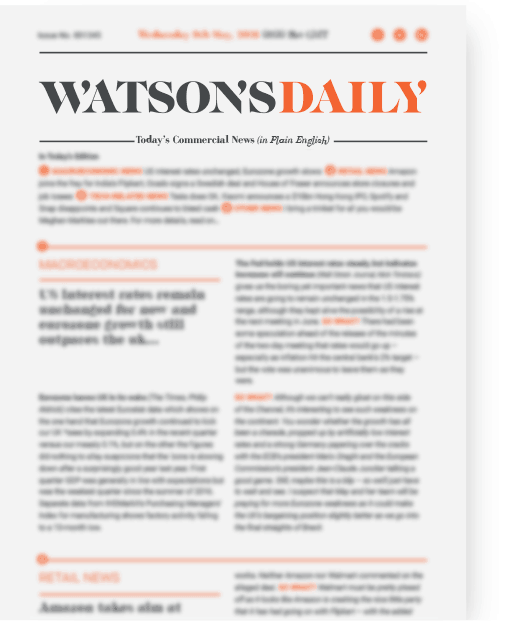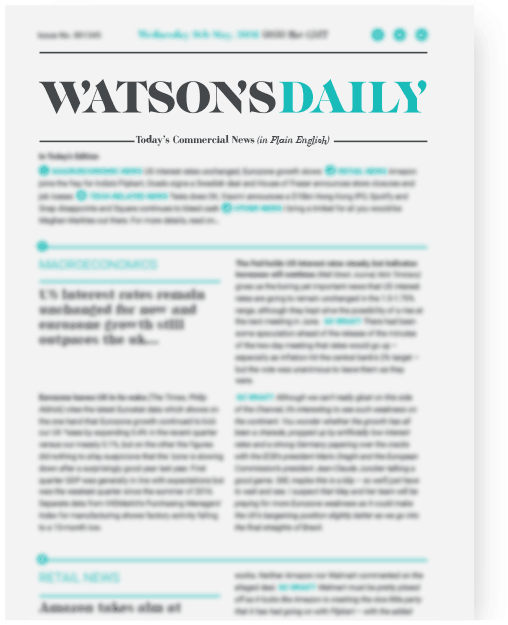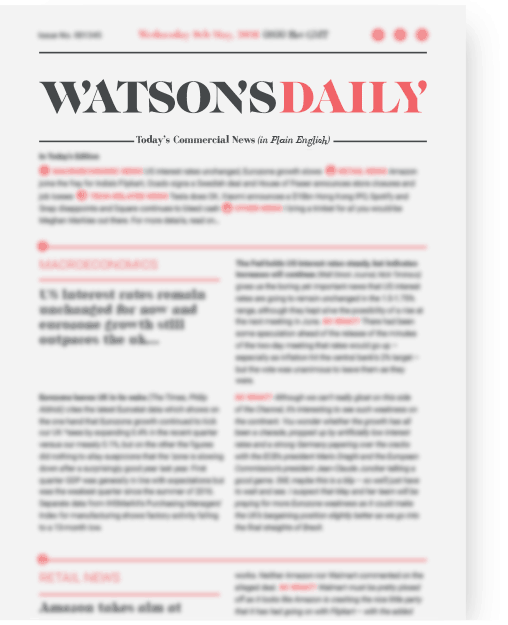- In TECH NEWS, Apple changes its tune and Samsung gets gloomy about the outlook
- In CAR NEWS, UK sales continue to fall and Tesla aims for China production this year
- In RETAIL NEWS, Aldi and Dunelm toast a solid Christmas
- In FLEXIBLE OFFICE NEWS, SoftBank scales back its proposed WeWork investment big time
- In OTHER NEWS, I bring you a nice origami idea. For more details, read on…
1
TECH NEWS
So Apple relents and Samsung gets real…
Apple changes strategy to stream video on Samsung TVs (Financial Times, Tim Bradshaw) heralds a big change in strategy for Apple as this is the first time that it has allowed a TV manufacturer to integrate iTunes – previously, it had encouraged iTunes users to buy its £179 Apple TV box to watch content from the iTunes store. Take up was very low due to the number of alternative (and cheaper) devices and it seems that Apple is now acknowledging this by opening up. This means that owners of Apple’s devices will be able to stream content from their gadgets to the newest TV sets from Samsung, LG and Vizio using AirPlay 2. This deal follows a partnership announced late last year with Amazon to put Apple Music on its Echo speakers that are controlled by Alexa. * SO WHAT? * I think this is a great – and much needed – move by Apple. I suppose there are different ways you could look at this latest development. On the one hand, you could say that this is an admission of weakness for Apple in that it can no longer rely on people buying its stuff and staying in Apple’s walled garden. On the other, you could say that this is an important moment for the company as it tries to move away from being predominantly hardware-focused to becoming more software/services oriented. Increasing the number of Apple-compatible devices should be very lucrative – in the past, when Apple brought iTunes to
Windows in 2003, the popularity of Apple’s iPod music player exploded! Video is likely to be its next major focus as it tries to take on the likes of Netflix, Amazon Prime Video and Hulu with the upcoming launch of its new streaming service with $1bn-worth of new TV shows and films, so I think this opening up is a no-brainer. Mind you, if it REALLY wanted to do something impressive in TV it could, of course, buy Netflix given that it has a massive $130bn net cash pile…
In Samsung echoes Apple’s gloomy outlook as tech woes get worse (Wall Street Journal, Timothy Martin) we see that the South Korean consumer electronics giant has painted a downbeat outlook by announcing expectations that its fourth-quarter operating profit will fall by 29%, which is way below analyst expectations. The company said that it was due to “mounting macro uncertainties” and blamed “lacklustre demand” for memory chips and “intensifying competition” in its handsets business. * SO WHAT? * This is rather disappointing given that the company has, for the last 18 months, regularly delivered record profits, but it seems that even the mighty Samsung is catching the tech-lurgy that has been infecting previously invincible tech companies. Samsung is a bellwether for the global tech industry given its size and broad product array – and so news of its downbeat expectations won’t sit well with investors. Even the company’s memory business – which has accounted for 75% of operating profits in recent quarters – is likely to be subdued for the first quarter (although the company expects this to turn around in the second half).
2
CAR NEWS
UK car sales continue to slow down…
Plunge in new car sales the worst since 2008 financial crisis (Daily Telegraph, Sophie Christie and Alan Tovey) just tells us what we all probably expected anyway, given the current economic backdrop. Full year figures from the Society of Motor Manufacturers and Traders (SMMT) showed new car registrations down by 6.8% on the previous year as the trade body blamed uncertainty about the future of diesel and tighter new emissions testing regimes causing supply bottlenecks. Petrol-powered car sales rose by 8.7% for a 62.3% market share and alternatively fuelled vehicle (AFV) demand rose strongly to take 6% market share overall – a new record. Petrol-electric hybrids and plug-in hybrids proved to be popular in the AFV segment with sales growth of 21.3% and 24.9% respectively. Sales of electric-only cars grew by 13.8%, but they still only account for a miniscule 0.7% of the overall
market. * SO WHAT? * Another day, another day of bleating by the SMMT, blaming its woes on policymakers. Still, despite the overall negative mood, demand for new cars is quite stable overall and the British automobile market is still the second biggest in the EU, behind Germany.
Elon Musk’s China factory – now a field, soon a plant – aims to pump out its first Tesla this year (Wall Street Journal, Trefor Moss) highlights the start of the construction of Tesla’s new China factory, the first wholly foreign-owned car plant in the country. Musk said that he aims for the plant to be built “in record time” so that the first Model 3 could roll off the production line by the end of this year with volumes ramping up sharply next year. * SO WHAT? * Tesla needs this thing to work. The China market has huge potential and this factory will give the company a proper foothold, but it also has to get its skates on as all the other established manufacturers – both Chinese and foreign – are all trying to crash the EV party that Musk started. Tesla’s form on hitting deadlines isn’t great, but the pressure will now be even more intense to meet this one given the growing competition.
3
RETAIL NEWS
Aldi and Dunelm toast good Christmas cheer…
Christmas luxuries increase sales at Aldi to almost £1bn (The Guardian, Rob Davies and Sarah Butler) shows just how successful the German discounter was over Christmas as its sales were boosted by rising demand for its luxury ranges. The UK’s 5th biggest supermarket said that the week beginning 17th December was its busiest ever, with sales 10% higher than last year. Aldi has 827 stores in the UK, with plans for 70 more this year, burnishing its reputation for being the UK’s fastest-growing supermarket. Market share data and supermarket sales figures will continue to be announced during the course of this week.
Dunelm upgrades profit forecasts after very merry Christmas (Daily Telegraph, Julia Bradshaw) shows that it’s not all doom and gloom on the high street as homewares specialist Dunelm benefited from brisk sales of brushed cotton and teddy-themed bedding, sheepskin rugs and unicorn pillowcases. Total sales were up by 2% despite the cost of closing down its Worldstores and Kiddicare websites and selling off its Achica site. Even profitability had gone up, due in part to a stronger pound, but also to the company’s ditching of low-margin products and incorporation of higher margin ones on its website. The company’s shares shot up by 12% but chief exec Nick Wilkinson was keen not to get too excited as he said that “Despite our strong performance in the year to date, we remain cautious on the outlook for the second half given the ongoing uncertainty in the UK economy”.
3
FLEXIBLE OFFICES NEWS
SoftBank cuts its commitment to WeWork as the flexible office space frenzy calms…
SoftBank to slash planned WeWork investment (Financial Times, Eric Platt and Arash Massoudi) will be a bit of a shock to the trendy WeWork as Japan’s SoftBank has put the brakes on proposed investment in the office space supremo. SoftBank had been talking about a $16bn investment this year, but this has been slashed dramatically to “only” $2bn. It will not include participation from SoftBank’s Vision Fund (which has already put $8bn in to WeWork thus far) and an official announcement is expected to be made this week. Flexible office providers may fail as rents fall (The Times, Louisa Clarence-Smith) predicts that other flexible office space providers will fail this year as they are forced to lease out property below the
rate they are paying their own landlords. Mat Oakley, head of commercial research at Savills, pointed out that “There is very little product differentiation in the sector. There are new entrants piling in…and if you’re only competing on price, it’s very much a downward spiral. I think we will start to see some failures in that sector from this year”. * SO WHAT? * The flexible office segment has been going bananas in the last few years and so it was bound to come a cropper at some point. The danger here is that the sudden slowdown of SoftBank’s investment in WeWork could start off a chain reaction in the sector with smaller operators starting to hit the panic button. I don’t think it’s an unmitigated disaster for WeWork (SoftBank and the Vision Fund could just as well change their minds further down the road), but it’s not going to be great for them in terms of sentiment. Given the rough ride that tech shares have had in the last few months it’s not surprising that members of the Vision Fund are wary of making big new investments. Maybe this development will give everyone a welcome pause for breath.
4
OTHER NEWS
And finally, in other news…
You are probably going to think that I am mad sharing this, but I think Origami memory jars: Japanese Twitter’s beautiful way to collect happy memories like a coin bank (SoraNews24, Casey Baseel https://soranews24.com/2019/01/08/origami-memory-jars-japanese-twitters-beautiful-way-to-collect-happy-memories-like-a-coin-bank/) is actually a rather nice way of keeping your sanity with a useful little reward at the end of it.
Some of today’s market, commodity & currency moves (as at 0819rs green is up, red is down). THIS IS INTENDED AS A ROUGH GUIDE ONLY!
| FTSE 100 * | Dow Jones * | S&P 500 * | Nasdaq * | DAX * | CAC-40 * | Nikkei ** | Shanghai ** |
| 6,811 (-0.39%) | 23,531 (+0.42%) | 2,550 (+0.70%) | 6,823 | 10,748 (-0.18%) | 4,719 (-0.38%) | 20.204 (+3.28%) | 2,528 (-0.20%) |
| Oil (WTI) p/b | Oil (Brent) p/b | Gold Per t/oz | £/$ | €/$ | $/¥ | £/€ | $/₿ |
| $48.4284 | $57.4642 | 1,283.94 | 1.27564 | 1.14358 | 109.01 | 1.11553 | 3,985.00 |
(markets with an * are at yesterday’s close, ** are at today’s close)





